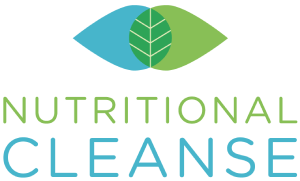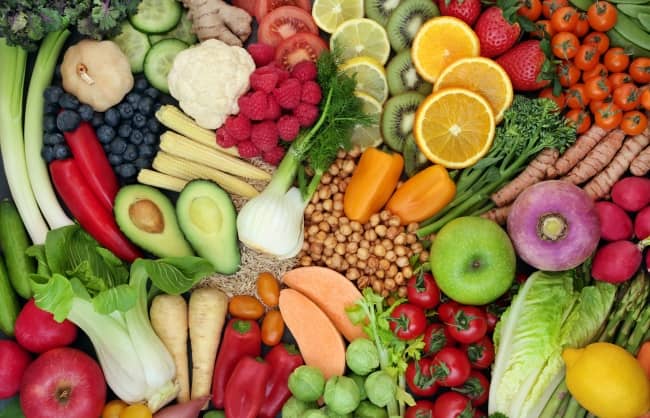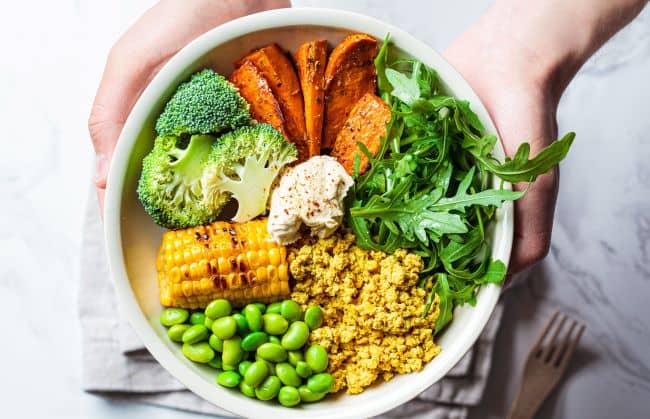A Guide to a Plant-Based Diet for Beginners
A gluten-free diet.
The Atkins diet.
The Keto diet.
A vegan diet.
The Paleo diet.
With so many popular diets, it can be difficult to know which way of eating is the healthiest. While each diet has its pros and cons, there is no doubt that a diet focusing on fresh, whole, minimally processed foods can be a great way to nourish your body.
A plant-based diet can supply your body with the nutrients, antioxidants, vitamins, and minerals needed to help you support overall wellness, lose weight, and feel your best.
Here, we’ll look at what a plant-based diet is, the potential health benefits of a plant-based diet, and how to get started on a plant-based diet.
What Is A Plant-Based Diet?
There is no single definition of a plant-based diet, but a plant-based diet usually focuses on:
- Cutting back on processed foods
- Consuming whole foods that are natural, minimally processed, and unrefined
- Foods that come from plants such as whole grains, legumes, nuts, seeds, fruits, and vegetables
- Limited animal products
- High-quality food
- Locally sourced, organic options whenever possible
What Is the Difference Between a Vegan and Plant-Based Diet?
While vegetarian, vegan, and plant-based diets do share some similarities, they also have key differences:
- Vegan diets avoid all animal products, including items such as honey, butter, eggs, meats, poultry, seafood, dairy, etc.
- Vegans can still eat highly processed imitation meats and cheeses while a plant-based diet chooses minimally processed whole foods that are as close to nature as possible
- Vegetarians abstain from all meat but consume eggs, dairy, and sometimes seafood
A plant-based diet is a flexible way to include more fruits, vegetables, and whole foods in your diet while still consuming occasional animal products.
What Are the Benefits of a Plant-Based Diet?
Potential Benefits of a plant-based diet include:
- Easier weight management — Studies show that individuals who consume a plant-based diet tend to weigh less than those who don’t and have an easier time keeping off any weight they lose (all without counting calories)
- Reduced risk of health conditions – A plant-based diet may prevent a variety of health conditions
- A reduced environmental footprint— Plant-based diets can reduce your environmental footprint
- A natural boost in energy
- Improved physical performance
- Reduced inflammation
- Improved health and well-being
- Save money on groceries — Some of the staples of a plant-based diet are also some of the most affordable, healthy foods. Stock up on potatoes, brown rice, and dried beans to eat healthily and save money at the same time.
Tips on Starting A Plant-Based Diet for Beginners
Here are tips for starting a plant-based diet:
- Take it to step by step and add gradual changes to your diet. There is no need to completely overhaul your diet overnight. Try making one or two meals a week plant-based or aim to try at least three new plant-based recipes a week.
- Focus on adding filling plant-based foods to your diet to help keep you satisfied and full. Great examples include starchy vegetables, whole grains, and legumes.
- Eat a lot of vegetables — Aim to fill half your plate with vegetables at meal times.
- Use meat in smaller amounts (have it as a side dish rather than the main course).
- Focus on healthy fats from nut butters, nuts, olive oil, seeds, and avocados.
- Build your meals around whole grains, beans, legumes, nuts, and seeds.
- Include whole grains as part of your breakfast — Start with a bowl of barley, oatmeal, or quinoa and top it with fresh fruits, nuts, and seeds.
- Include a variety of greens in your diet (Romaine lettuce, collards, kale, Swiss chard) by eating them in salads, tossing greens into soups near the end of cooking, adding greens to omelets, and adding them to smoothies.
- Satisfy your cravings for sweets naturally with fruit.
- Read labels carefully — just because something appears healthy or is labeled “plant-based”, always read the label and watch out for added sugars, preservatives, additives, and trans fats.
Sample Plant-Based Meal Plan
Here is an example plant-based meal plan to inspire you as you get started:
Plant-Based Breakfast Ideas
- Oatmeal topped with walnuts, sliced bananas or strawberries, and a sprinkle of cinnamon
- A whole-wheat English muffin or slice of toast topped with fresh avocado and tomato slices
- A whole-wheat tortilla filled with scrambled eggs and your choice of salsa, hot sauce, cheese, onions, bell peppers, mushrooms, black beans, and asparagus
Plant-Based Lunch Ideas
- Tomato basil soup, an apple or pear, sprouted whole-grain crackers
- A salad of mixed organic greens and your choice of toppings: diced boiled egg, fresh herbs, extra virgin olive oil, balsamic vinegar, Kalamata olives, feta cheese, diced tomatoes, cucumbers, shredded carrots, pomegranate seeds, sunflower seeds, and a whole-wheat pita on the side
- Vegetarian pizza with your choice of healthy toppings: Mozzarella cheese, mushrooms, onions, bell peppers, broccoli, onions, tomato, olives
Plant-Based Dinner Ideas
- Veggie Lasagna – Simply make lasagna but swap out the noodles with sliced strips of zucchini and replace the meat with sauteed mushrooms
- Grilled vegetable kabobs, whole wheat pitas with hummus, and a side of sauteed quinoa
- Whole-wheat pasta topped with no-sugar-added tomato sauce and a veggie-heavy salad
Is a Plant-based Diet Right for Me?
The only way to know if a plant-based diet is right for you is to try it. There’s no need to completely cut out all your favorite foods or animal products. Start with small changes and see if you notice positive benefits. From there, you can work on adding more plant-based, whole foods to your diet and consuming fewer animal products.
A Plant-Based Shopping List
Looking for ideas for a healthy grocery shopping list? We’ve put together a grocery shopping list of plant-based foods:
- Vegetables — Broccoli, carrots, asparagus, cauliflower, spinach, kale
- Fruits — Citrus fruits, berries, grapes, bell peppers, tomatoes, peaches, bananas, apples, pears, kiwis, melons, pomegranates, avocados
- Starchy Vegetables — Squash, potatoes, pumpkin, sweet potatoes, turnips, beets
- Healthy Fats — Olive oil, extra virgin coconut oil, avocados, grass-fed butter
- Herbs and Spices — Rosemary, black pepper, basil, oregano, turmeric, thyme, sage, parsley, mint
- Whole Grains — Oats, quinoa, millet, barley, brown rice
- Legumes — Lentils, black beans, peanuts, chickpeas, peas
- Plant-Based Milks — Opt for unsweetened almond, cashew, or coconut milk
- Nuts and Seeds — Sunflower seeds, almonds, pistachios, pumpkin seeds, chia seeds, hemp seeds, cashews, Brazil nuts
- Nut Butters — Macadamia nut butter, almond butter, peanut butter, cashew butter
- Condiments — Nutritional yeast, apple cider vinegar, mustard, salsa
- Beverages — Sparkling water, coffee, tea
- Plant-based Protein Products — Tempeh or tofu (check the ingredient lists and avoid products with artificial ingredients or added sugar)
- Plant-Based Protein Shakes — A high-quality plant-based protein shake is a convenient way to get a dose of plant-based nutrition, even on busy days
If you choose to supplement your plant-based diet with animal products, opt for locally raised, sustainably sourced, organic, high-quality eggs, poultry, seafood, beef, pork, and dairy when possible.
Foods to Avoid on a Plant-Based Diet
While nothing is off-limits on a plant-based diet, certain foods are important to limit if you want to feel as healthy as possible:
- Processed sweets — Cookies, pastries, candies, sugary cereals, muffins, cakes, candy bars
- Fast Food — Takeout, chicken nuggets, burgers, hot dogs, French fries
- Convenience Foods — Cereal bars, frozen dinners, chips, crackers
- Processed Vegan Foods — Faux cheeses (try nutritional cheese instead for a plant-based, whole food option), vegan butter, plant-based meats
- Refined Grains — White bread, white bagels, white pasta, white rice, foods made from white flour
- Artificial Sweeteners
- Processed Animal Products — Lunch meats, beef jerky, sausage, bacon
Want to Learn More About a Plant-Based Diet?
Consuming a plant-based diet focused on whole, minimally processed foods has been linked to various health benefits.
If you would like to learn more about plant-based eating or get started on your health journey, we invite you to reach out to us. We’d be happy to answer your questions and provide personalized product recommendations so you can get closer to your health and fitness goals.













